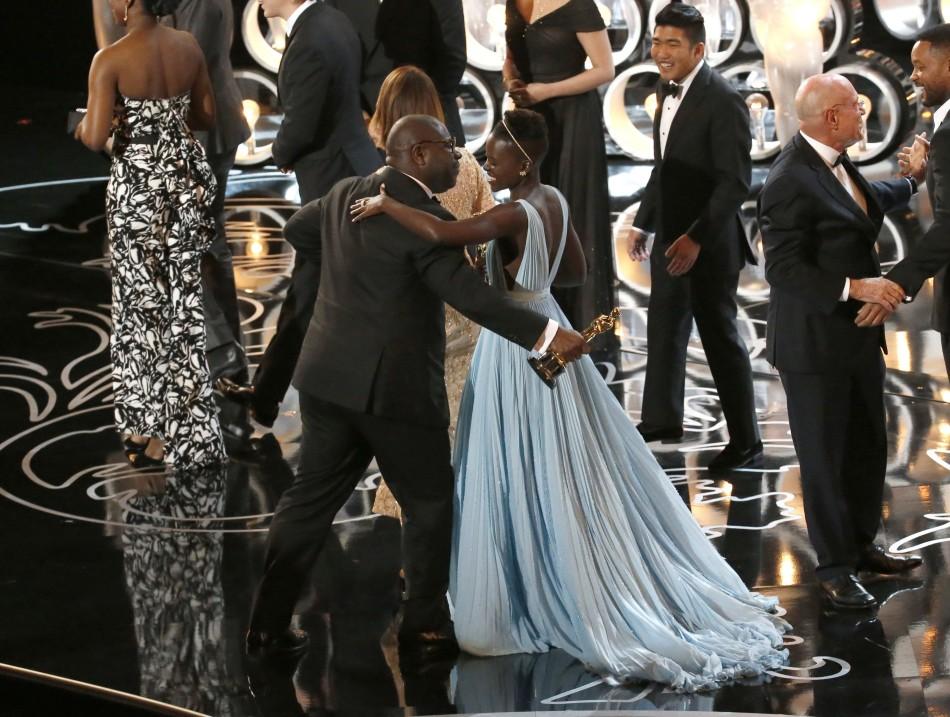Oscars prove cinematic talent hails from around the world
Steve McQueen leans in to kiss Lupita N’yongo as “12 Years a Slave” celebrates on stage during the 86th annual Academy Awards. McQueen and N’yongo were just two of the many international artists who swept the Oscars this year.
March 4, 2014
It’s over. The Academy Awards are out, and there’s nothing we can do anymore in our campaign for Leonardo DiCaprio’s impossible Oscar.
Now all we can do is watch the winning films while we avoid dealing with our impending final exams. This could mean anything from watching “Frozen” for the seventh time or seeing why both Jared Leto and Matthew McConaughey deserved their first Oscars for their performances in “Dallas Buyer’s Club.”
If you want to be less predictable, you’ll watch “The Great Beauty,” this year’s Best Foreign Language Film.
Directed by Paolo Sorrentino, the film portrays the present day Roman elite as seen through the eyes of writer Jep Gambardella, played by Toni Servillo. Jep was catapulted into high social class by the success of his novel years ago, but his 65th birthday forces him to re-examine how he has been living his life. The film has been praised for highlighting the beauty of Rome and offering a depiction of what it is like to come to terms with aging.
Alright, stop yawning, I know this does not sound like the most interesting movie of all time. I’m not going to lie and say I was able to sit through its run of more than two hours. However, I highly recommend watching at least some of it. Do it for the Italian language. Do it for the incredible cinematic images of the Roman landscape. Do it for the party scenes.
Seriously, the parties in “The Great Gatsby” and “The Wolf of Wall Street” have nothing on the scenes in “The Great Beauty.” They include mariachi bands, a little girl crying and throwing paint at a canvas while hundreds watch, knife throwing, a choreographed dance and lots and lots of naked Italian people. These scenes sometimes last longer than 15 minutes. It was jarring to see them followed by the recurring images of churches, choir music and scenes of convents and nuns.
So, it didn’t quite put me at the edge of my seat, but “The Great Beauty” did prove to me that great cinema can come from outside of Hollywood.
This year, though, this should have been obvious without even considering the Best Foreign Language Film Oscar.
Mexico-born Kenyan actress Lupita Nyong’o had been receiving praise for her performance in “12 Years a Slave” long before she won Best Supporting Actress at the Oscars. Both the Kenyan and Mexican presidents tweeted their congratulations to Nyong’o. “12 Years a Slave,” directed by Brit Steve McQueen, also won Best Picture and Best Adapted Screenplay.
“Gravity,” another film directed by a non-American, also conquered this year’s awards. It won seven Oscars, including Best Director. It was the first Oscar for Mexican director Alfonso Cuaron. Speaking backstage after his victory, he said he hoped his achievement would help shine a light on the work of other Mexican filmmakers and culture.
For now, we know Nyong’o and Cuaron by name because they are the few foreign gems in the crown of filmmaking. But if things keep going the way they are, soon more foreign players will be off the bench and starting in the game of cinema. Thus I finish this quarter with a message that has seeped into each of my articles this year: Watch out, America, here comes the world.
Email: sofiarada@u.northwestern.edu



